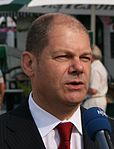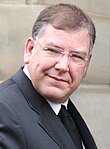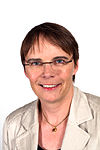
The Free Democratic Party is a liberal political party in Germany.

Alliance 90/The Greens, often simply referred to as Greens, is a centre-left green political party in Germany. It was formed in 1993 by the merger of the Greens and Alliance 90. The Greens had itself merged with the East German Green Party after German reunification in 1990.

Angela Dorothea Merkel is a German retired politician who served as Chancellor of Germany from 2005 to 2021. She is the only woman to have held the office. She previously served as Leader of the Opposition from 2002 to 2005 and as Leader of the Christian Democratic Union from 2000 to 2018. During her chancellorship, Merkel was frequently referred to as the de facto leader of the European Union (EU) and the most powerful woman in the world.
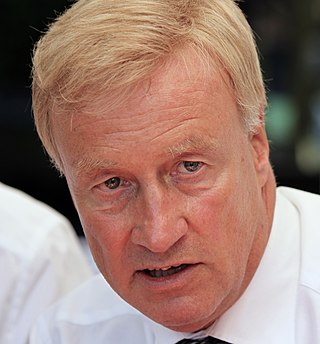
Ole von Beust is a former German politician who was First Mayor of Hamburg from 31 October 2001 to 25 August 2010, serving as President of the Bundesrat from 1 November 2007 on for one year. He was succeeded as mayor by Christoph Ahlhaus.

Federal elections were held in Germany on 18 September 2005 to elect the members of the 16th Bundestag. The snap election was called after the government's defeat in the North Rhine-Westphalia state election, which caused them to intentionally lose a motion of confidence to trigger an early federal election. The outgoing government was a coalition of the centre-left Social Democratic Party of Germany (SPD) and Alliance 90/The Greens, led by federal Chancellor Gerhard Schröder. The election was originally intended for the autumn of 2006.
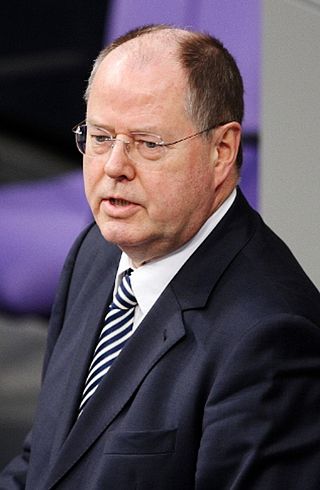
Peer Steinbrück is a German politician who was the Chancellor-candidate of the Social Democratic Party (SPD) in the 2013 federal election. Steinbrück served as the eighth Minister-President of North Rhine-Westphalia from 2002 to 2005, a member of the Bundestag from 2009 to 2016, and as Federal Minister of Finance in the first Cabinet of Chancellor Angela Merkel from 2005 to 2009.
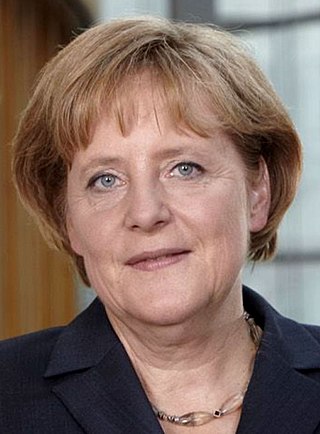
Federal elections were held in Germany on 27 September 2009 to elect the members of the 17th Bundestag.
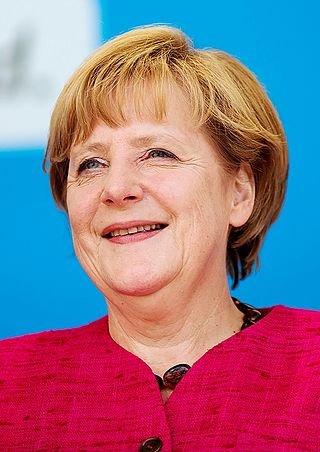
Federal elections were held on 22 September to elect the members of the 18th Bundestag of Germany. At stake were all 598 seats to the Bundestag, plus 33 overhang seats determined thereafter. The Christian Democratic Union of Germany/Christian Social Union of Bavaria (CDU/CSU) of incumbent chancellor Angela Merkel won their best result since 1990 with nearly 42% of the vote and nearly 50% of the seats, just five short for an overall majority. The Free Democratic Party (FDP) failed to meet the 5% vote electoral threshold in what was their worst showing ever in a federal election, denying them seats in the Bundestag for the first time in their history.
Grand coalition is a nickname in German politics describing a governing coalition of the parties Christian Democratic Union (CDU) along with its sister party the Christian Social Union of Bavaria (CSU) and the Social Democratic Party (SPD), since they have historically been the major parties in most state and federal elections since 1949. The meaning of the term may change due to the growth of some formerly minor parties in recent years.

Christoph Ahlhaus is a German politician. He is a representative of the German Christian Democratic Union which he joined in 1985. He was the mayor of Hamburg from August 2010 to March 2011.

The 2011 Baden-Württemberg state election was held on 27 March 2011 to elect the members of the 14th Landtag of Baden-Württemberg. The incumbent coalition government of the Christian Democratic Union and Free Democratic Party led by Minister-President Stefan Mappus lost its majority. The Greens achieved their best result in a state election up to this point at 24%, and became the second largest party in the Landtag. They subsequently formed a coalition with the Social Democratic Party (SPD), and Greens leader Winfried Kretschmann was elected Minister-President. He became the first Green politician to serve as a state head of government in Germany.

The 2012 North Rhine-Westphalia state election was held on 13 May 2012 to elect the members of the Landtag of North Rhine-Westphalia. The incumbent minority government of the Social Democratic Party (SPD) and The Greens led by Minister-President Hannelore Kraft was returned with a majority and continued in office. The seat count drastically increased from 181 in the previous election to 237.

Winfried Kretschmann is a German politician serving as Minister-President of Baden-Württemberg since 2011. A member of the Alliance '90/Greens, he was President of the Bundesrat and ex officio deputy to the President of Germany from 2012 to 2013. He is the first member of the Greens to serve in these offices. Identifying himself as a green conservative, Kretschmann has been associated with both culturally and economically liberal policies.

Federal elections were held in Germany on 24 September 2017 to elect the members of the 19th Bundestag. At stake were at least 598 seats in the Bundestag, as well as 111 overhang and leveling seats determined thereafter.

Stephan Weil is a German politician and the leader of the Social Democratic Party in Lower Saxony. On 20 January 2013, the SPD and the Green party won the 2013 Lower Saxony state election by one seat. On 19 February 2013, he was elected Minister President of Lower Saxony with the votes of SPD and Alliance '90/The Greens. From 1 November 2013 until 31 October 2014 he was President of the Bundesrat and ex officio deputy to the President of Germany. In November 2017, he was again elected Minister President with the votes of SPD and CDU.

The 2014 Saxony state election was held on 31 August 2014 to elect the members of the 6th Landtag of Saxony. The incumbent coalition government of the Christian Democratic Union (CDU) and Free Democratic Party (FDP) led by Minister-President Stanislaw Tillich was defeated as the FDP lost all its seats. The CDU subsequently formed a grand coalition with the Social Democratic Party (SPD), and Tillich was re-elected as Minister-President.
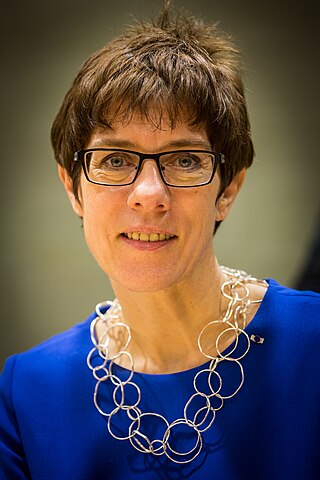
The 2017 Saarland state election was held on 26 March 2017 to elect the members of the Landtag of Saarland. The incumbent grand coalition of the Christian Democratic Union (CDU) and Social Democratic Party (SPD) led by Minister-President Annegret Kramp-Karrenbauer was returned with an increased majority.

Federal elections were held in Germany on 26 September 2021 to elect the members of the 20th Bundestag. State elections in Berlin and Mecklenburg-Vorpommern were also held. Incumbent chancellor Angela Merkel, first elected in 2005, chose not to run again, marking the first time that an incumbent Chancellor of the Federal Republic of Germany did not seek re-election.

The 2020 Hamburg state election was held on 23 February 2020 to elect the members of the 22nd Hamburg Parliament. The outgoing government was a coalition of the Social Democratic Party (SPD) and The Greens led by First Mayor Peter Tschentscher.
A black-green or green-black coalition is a coalition between a conservative and/or Christian Democratic party and a green party.
